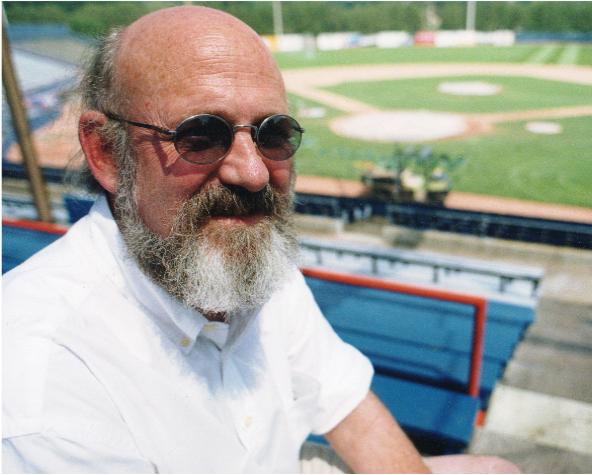
Tuesday, August 17, 1999
It's Werewolves 101 under Prof. Palmer
By ERIC BENDER, Free Press Sports Reporter
 |
Werewolves 101
Tuesday, August 17, 1999 It's Werewolves 101 under Prof. Palmer
|
There's no such thing as a clutch hitter in baseball.
RBIs are lies.
So says John (Doc) Palmer, associate professor of economics at the University of Western Ontario and sometimes baseball broadcaster.
The enigmatic prof who does London Werewolves play-by-play for Western's CHRW bills himself as an "econoclast."
Palmer will be in the Labatt Park broadcast booth tonight for the final of
three CHRW broadcasts this season. But the station is looking to do a full slate
of home games next season.
"It's too bad there's no budget to go on the road," Palmer laments,
"because I believe Londoners would like to hear road games more than home
games."
Palmer, who is seemingly an analyst and critical observer of everything around him -- a trait particularly suited to an economist or a broadcaster -- has always been interested in sports because of the recorded statistics that games and performances provide.
Particularly baseball.
"I like sports," says Palmer. "I like to look at the statistics a lot for what they tell you about the action. I like to analyze the numbers and see what's going on."
Palmer, who came to Western in 1971 from his native Muskegon, Mich., says he
became interested in myths and misconceptions when he bought a baseball book by
Bill James called Baseball Abstract for his wife, who also is a fan.
"I read it, and it's the most cogent analysis I'd ever read about
baseball."
Palmer is interested in more than just stats. As an economic prof, he has developed a course called Economics of Sport, about the place of sports organizations in the community and the overall economic picture. He has also written press articles in the current debate over government subsidies for professional teams (he's dead against it).
It was back during the second year of that the London Tigers, the double-A affiliate of the Detroit Tigers, were playing in Labatt Park that Palmer was asked to do his analysis on CHRW of the taxi debate that has lingered on in the city. He said he'd rather be doing baseball if he was going to be on radio. CHRW then carried a steady diet of Tigers games with Palmer until the team folded and left town.
Palmer loved it, and his style didn't go unnoticed even though the station's signal doesn't reach even as far as Clinton, where he now lives. He was asked for an audition tape when the Lynx, a farm team of the Expos, began operating in Ottawa. Palmer didn't think it would lead to a big-league broadcasting career (although he'd love that) and he didn't want to give up his day job.
When the Werewolves came to London this season, Palmer was back at Labatt Park. He has since been added to Rogers cable telecasts.
But he's a strong critic of sports broadcasters, particularly those who use cliches and promote misconceptions (what he terms "mediots").
He simply won't use RBIs (runs-batted-in) as a statistic to measure a player's ability. "You can't get RBIs if there's no one on base," he explains.
Palmer also looks askance at the win-loss record of pitchers, much of which depends on a team's ability to score runs.
"Scoring on errors," he says, "is open to a lot of interpretation."
Another myth he destroys by analyzing statistics is that a batter has "protection" (will do better) if he has a good hitter behind him.
"It's not true when tested. A good or bad batter behind you doesn't make any difference. You don't get any more pitches to hit. The only thing is that you may get more walks."
"Clutch ability" is another conception Palmer like to puncture. Getting a clutch hitter up in a key situation doesn't work, according to his analysis. "There are clutch performances, but players hit at the same rate that they would at any other time."
Palmer says former Blue Jay Dave Winfield's timely hit in the 1992 World Series was no more "clutch" than were the hits of Robbie Alomar and Paul Molitor, who got on ahead of him.
Palmer said it's another cliche to say that a team has ability but is just not winning, that it's losing close games. A team that blows out another team has ability, but an examination of games won by one run indicates luck and pure randomness as the main factor, he argues.
He also has a feeling for "bandwagon fans" who turn out only when a team is winning. "I love them," he says. They can lift a team (franchise) financially during a season and keep it going into next year. And they are a real incentive for a team to improve its personnel -- because they will only come out when the team is good.
Another myth he tries to dispel is that when player salaries go up, ticket prices go up. Not connected, he affirms. Ticket prices are set by demand, or the perceived demand before the start of the season. "If I sign a soccer player for $10 million and people aren't willing to pay more than $10 a ticket, that's all I can charge."
Palmer's analysis of the Werewolves:
"I'm really impressed with the team now. They have depth in pitching and
batting. It's a team effort, not just a performance from a couple of
stars." Of the franchise, he lauds the efforts of president John Kuhn to
promote the team but worries that London may be too remote from the other (read
American) teams in the Frontier League.